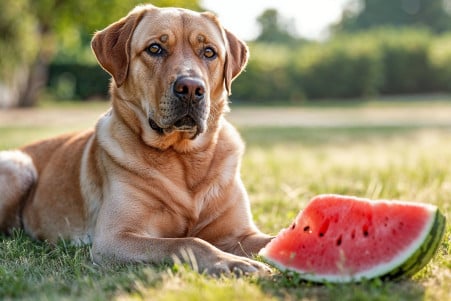Can Dogs Eat Cantaloupe? Safe Snacking Guide for Your Pooch
29 January 2024

Cantaloupe is a popular summer treat for people, thanks to its sweet flavor and nutritional benefits, but can dogs enjoy it as well? The answer is yes, dogs can eat cantaloupe, but there are some important things to keep in mind. Cantaloupe is a healthy, hydrating snack that’s packed with vitamins A, B-6, and C, as well as fiber.
However, make sure to cut it into bite-sized pieces and remove the seeds and rind to avoid a choking hazard, and always talk to your vet about portion control, especially if your dog has diabetes or is overweight.
This article will take a deep dive into the ins and outs of dog nutrition and review the scientific literature on the place of fruit in a dog’s diet. It will also discuss recommendations from experts on how to safely give your dog treats like cantaloupe. By looking at the most recent research in veterinary science and nutritional studies, you’ll be able to determine the best way to indulge your dog’s sweet tooth responsibly.
Can dogs eat cantaloupe?
Cantaloupe’s Nutritional Value for Dogs
In addition to being a tasty treat, cantaloupe is a nutrient-dense fruit that can offer several health advantages to dogs when given as an occasional snack. According to the University of Rochester Medical Center, one cup of cantaloupe provides dogs with a number of vitamins, including over 5000 IU of vitamin A, which is important for eye, skin, and coat health.
Meanwhile, the vitamin B-6 in cantaloupe helps dogs maintain healthy brain and immune system function, and the nearly 59mg of vitamin C per cup acts as an antioxidant and helps with tissue healing.
Cantaloupe also contains fiber, with about 1.44g per cup, which is important for dogs because it helps keep their digestive system running smoothly, supports healthy bowel movements, and promotes gut health.
That said, dog owners should also consider the sugar content of cantaloupe, which is about 12.58g per cup. According to PetMD, natural sugars are generally safe in moderation, but they can lead to problems like obesity and diabetes, especially in dogs that are prone to these conditions or are already overweight.
As a result, dog owners should consider the nutritional value of cantaloupe in light of the potential problems that can come with sugar before deciding whether to offer it to their pets.
Canine Companions and Cantaloupe: A Healthy Balance
Fruit, which includes a range of safe options like apples, bananas, and cranberries, can be a fun addition to your dog’s diet.
Cantaloupe, in particular, is another fruit that can be added to the list of safe treats for your dog.
Like blueberries and watermelon, cantaloupe is known for its hydrating properties, vitamins, and fiber, all of which can help with digestion and hydration, according to the American Kennel Club.
By balancing cantaloupe with other fruits that are also good for dogs, like strawberries, which are high in vitamin C and fiber, or pears, which are high in vitamins C and K, you can make sure your dog gets a range of nutrients without overdoing it.
To avoid choking hazards, both Forbes Advisor and the American Kennel Club recommend removing any inedible parts, like seeds and rinds. By incorporating a range of these healthy fruits in moderation, you can help your dog get a range of health benefits while also keeping their diet fun and interesting.
How to Tell If Your Dog Has a Cantaloupe Allergy
Just like people, dogs can have allergies, and According to VCA Animal Hospitals, the most common allergens are proteins. While cantaloupe is not typically an allergen, dogs can be allergic to any food, including fruit. Allergic reactions can cause itching, digestive issues, or even more severe symptoms like swelling or difficulty breathing. If you think your dog is having an allergic reaction, it’s important to call your vet right away.
Knowing how a dog’s digestive system works is important when it comes to introducing new foods like cantaloupe. According to Vetericyn, dogs have different digestive enzymes than humans and process sugars and fibers differently. While the fiber in cantaloupe can be good for a dog’s digestive system, The American Kennel Club says that dog owners should be aware of the sugar in cantaloupe, especially if their dog has a sensitive stomach.
When you introduce cantaloupe or any new food, make sure to do it in small amounts and watch your dog for a few days to see how they react. This will help you make sure that your dog isn’t intolerant or allergic to the food, and it will help you make sure that your dog has a safe and healthy experience with their new treat.
What Do Vets Say About Dogs Eating Cantaloupe?
Veterinarians believe that cantaloupe can be a healthy treat for dogs as long as it is given in moderation. The American Kennel Club notes that the fruit is good for dogs because it is high in water and contains lots of dietary fiber, vitamins B6, A, and C, and potassium, all of which can help with hydration, digestion, and cellular health.
That said, the AKC warns that the rind of the cantaloupe can cause stomach upset and should be avoided.
PetMD warns that the sugar content in cantaloupe means that it should be fed to dogs in moderation. The amount of cantaloupe that is safe for dogs to eat depends on their size, but in general, no more than 10% of a dog’s daily calories should come from treats. To help prevent choking, cantaloupe should be cut into small pieces.
Because of the potential downsides, including stomach upset and choking on seeds, TheSprucePets suggests that cantaloupe be introduced to dogs slowly and that it be prepared carefully. Dog owners should talk to their vet before giving their dog cantaloupe to make sure that the treat is appropriate for their dog’s health.
In general, vets believe that cantaloupe can be a healthy occasional treat for dogs as long as it is part of a balanced diet.
Final Thoughts: Can Dogs Eat Cantaloupe?
Cantaloupe is a healthy and safe treat for dogs that provides a variety of vitamins and helps keep them hydrated. However, it’s important to remember that cantaloupe should be given in moderation. This means following the ‘90–10 rule’ that veterinarians recommend, which states that treats should only make up 10% of a dog’s daily diet.
It’s also important to make sure that the seeds and rind are removed to avoid any potential choking hazards and to keep the treat safe.
As we’ve learned, the vitamins and fiber found in cantaloupe can help with everything from your dog’s eyesight to their digestive health. That said, it’s important to remember that every dog is different, and what works for one may not work for another. This is especially true for dogs with certain health issues, like diabetes or obesity, that could be exacerbated by the sugar in the fruit.
In short, while cantaloupe can be a healthy addition to your dog’s diet, it’s important to talk to your vet to get their personalized advice. A vet will be able to give you specific recommendations based on your dog’s individual health concerns to make sure that cantaloupe can be a part of their diet without causing any issues.


